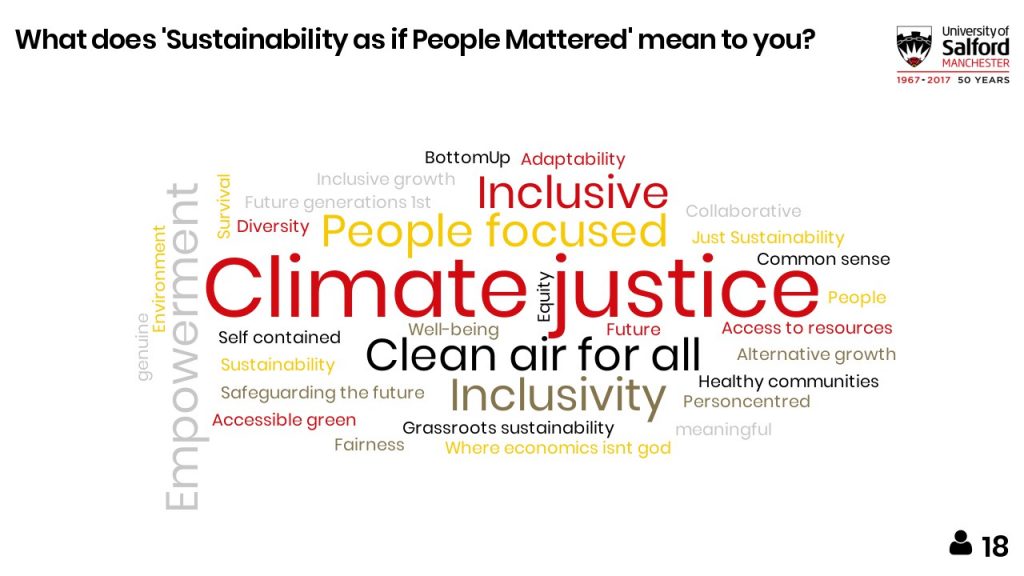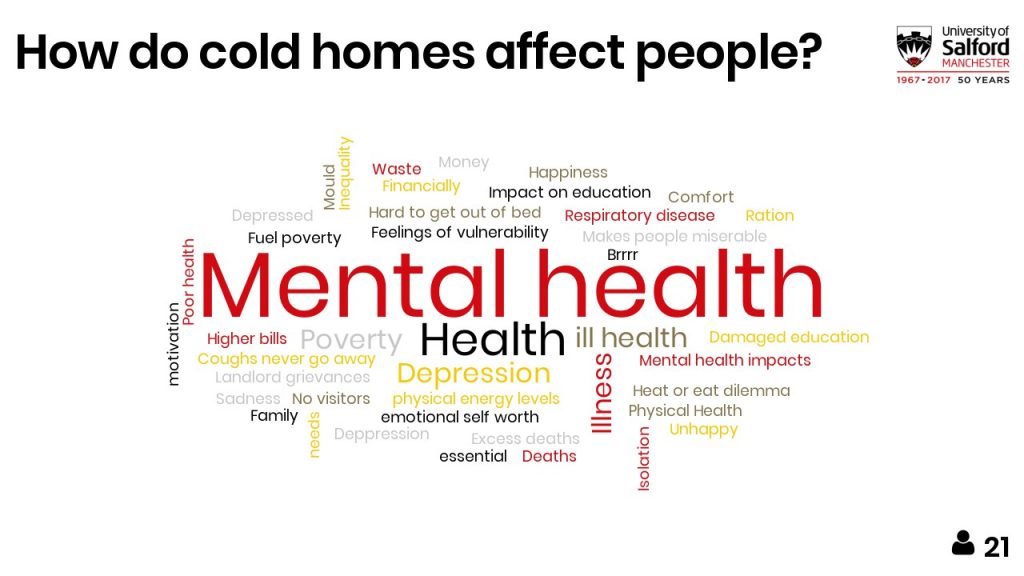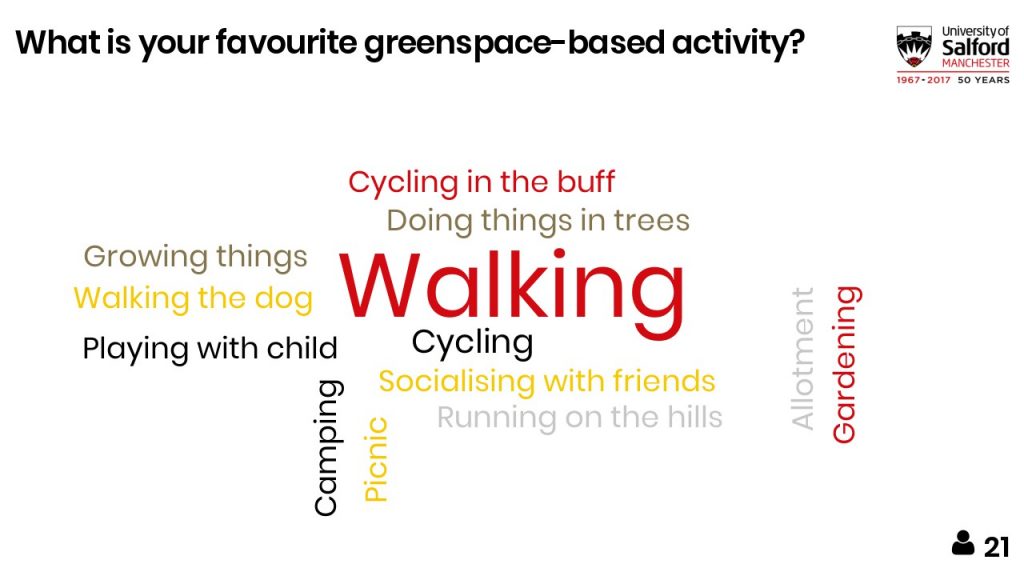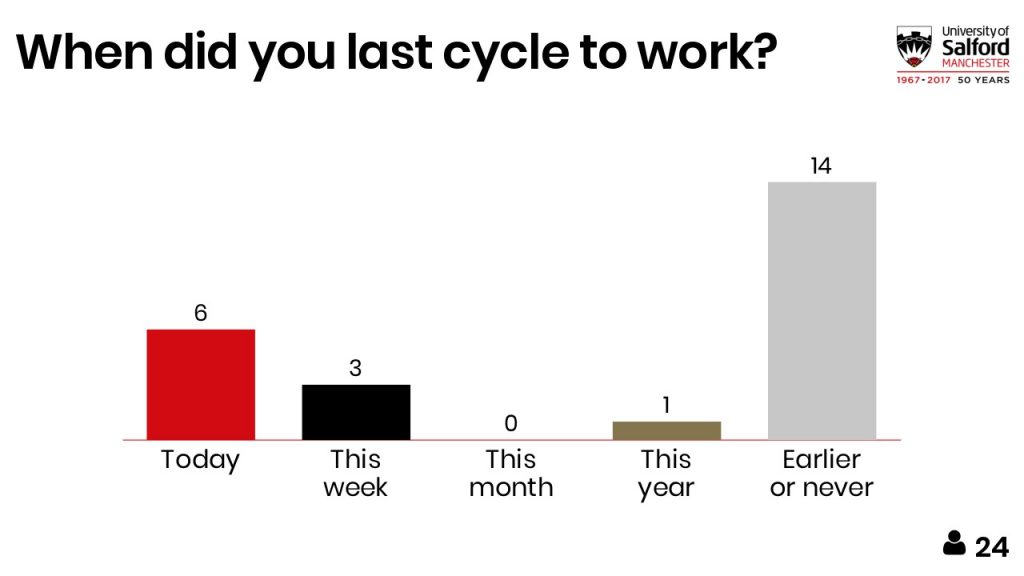SHUSU21: Sustainability & Society Event

Our fourth and final #SHUSU21 anniversary celebration was held at Islington Mill in Salford on the 16th November 2017, a vibrant arts, community and gig space occupying a collection of 19th and 20th century industrial buildings. They write on their website:
Created in 2000, Islington Mill remains a work in progress; an ever-evolving creative space, arts hub and community. Scratch the surface and you’ll find a vibrant and resourceful cross disciplinary creative network; a space where conversations lead to connections, collaboration and co-creation.
A brilliant place to host the kinds of conversations we hoped to have about how research and action come together to create a better world.
Professor Phil Brown opened up the afternoon, and then we reviewed the results of the event’s first audience poll with Dr Graeme Sherriff – What does sustainability as if people mattered mean to you? Climate justice, equality, common sense, clean air were just a few of the responses.

The afternoon consisted of four short conversations between a SHUSU researcher and a community organisation about our recent research collaborations. It showed the breadth of SHUSU’s work across the theme of sustainability and society, touching on fuel poverty, mental health, energy efficient housing, greenspace, and cycling. A panel of four experts followed, who shared their reflections on the challenges and possibilities for research collaboration ahead with some time for Q&A.

Keeping People Warm and Well: Changes4Warmth
This presentation paired Michaela Fyson from Beat The Cold with Danielle Butler of SHUSU to talk about an evaluation of Beat the Cold’s project to understand and reduce fuel poverty in Stoke-on-Trent. An estimated 4 million households live in fuel poverty in the UK – understood as the inability to afford to keep a home warm. The cost of this to the NHS in the form of illness and increased mortality is estimated at £1.36 billion. Service-users drove the research project as well as advocacy around the results linking mental and physical wellbeing to having a warm home. Research also established the importance of home visits as an effective way to build trust, get a real sense of what was happening, and find time and opportunity to really listen. Questions from the floor highlighted that this is a hard issue to raise funding around. It is not as sexy to funders, and it is difficult to prove direct causality from interventions around improved heating to improvements in physical and mental health. This is especially true in the short term – a common theme across the presentations was the importance of long-term thinking, and how often this is at odds with funders and policy makers who look for quick fixes.
Before each presentation, an audience poll was conducted. For this one, participants were asked think about the ways in which cold homes affect people:

Investing In Future Housing: Erneley Close Retrofit
The second set of conversations looked at an evaluation of tenant experience of PassivHaus technology, pairing Phil Martin of SHUSU with Dean Myers, a building surveyor working with social landlord One Manchester. The retrofit of Erneley Close brought the building up to PassivHaus standard – a building that maximizes housing design and insulation to minimise the amount of energy required to keep it warm. The project involved mixed methods research to capture residents’ ideas and ambitions for the retrofit, and found that the residents interviewed were very happy about the warmth and much lower heating costs achieved through the retrofit. At the same time, they highlighted some of the challenges around the retrofit, particularly the importance to tenants of feeling that they had control over their homes, both in terms of aesthetics as well as retaining the ability to open windows, decorate their homes, and have pets able to come in and out. View their presentation (as Prezi).
Before this presentation, the audience was asked to think about what they do or have in place in their home to save energy:

Green Activity as Care and Therapy: The Garden Needs Project
Next Michelle Howarth, a lecturer in nursing and SHUSU member, presented the Garden Needs Project with Kate Simpson of Social AdVentures, a health and wellbeing social enterprise. Their video showing gardening and community played in the background as the two spoke. And the project findings? “Gardening saves people lives” by connecting people with green-spaces and one another, shown to be key to mental health recovery, though the work needs time and stability. It has huge impacts on their lives and confidence, and as Kate Simpson said, the world opens up to them. A discussion of how this kind of non-clinical approach provides immense health benefits followed. There was also a great question on the inequalities so visible in horticulture – on the one hand the growth of celebrity culture and the heights of the RHS, and on the other small projects like this, often really struggling to sustain themselves. This is part of the reason the RHS is starting a new project in Salford and building new relationships while developing a greater focus around sustainability. Funding streams via social prescribing and the NHS could be another way to equalize things, and this is something that we are increasing our research around, particularly through a new Care Farm project that is just entering its second stage. View a video (YouTube) that accompanied their presentation.
Before this presentation people were asked about their favourite greenspace activities, which resulted in some surprises:

Making Cycling for Everyone: Training For Cycling And Driving
The final presentation brought together Pete Abel, information office at BikeRight! and Graeme Sherriff, Associate Director of SHUSU. The project both validated the effectiveness of cycle training, but in looking at attitudes and needs for training it found that everyone needs training for safer streets, both cyclists and drivers. Of course, not all groups would admit it, there was a ripple of laughter in the room as Pete mentioned the finding that a cohort of men have been cycling for years but cycling badly, and won’t admit they need (re)training. Similarly the feeling from other less confident potential cyclists expressed in the focus groups: why do we need training when the roads are terrible, there are no cycle lanes and so many drivers are trying to kill us? It highlights the importance of a change in how we do things and the need for training to make cycling a socially inclusive activity. The research into these perceptions has had a direct impact on how BikeRight! now undertakes their outreach and advertising. Improving confidence among certain groups of cyclists while training for improved safety among others is a valuable outcome.
Two recent SHUSU reports provide further information about this research:
- Communicating Cycle Training: Perceptions and Experiences of Adult Cycle Training
- ‘Seeing it from a cyclist’s point of view is totally different.’ Understanding the impact of cycling awareness training for HGV drivers
Before this presentation, the audience were polled on whether they cycle to work. The results were fairly typical in a national context in that a small minority did:

The Panel
The final panel consisted of William Baker, Energy advice development lead for Citizens Advice, Chris Blythe, Director of the Federation of City Farms & Community Gardens (FCFCG), Marianne Heaslip, Associate Principal of URBED, and Helen Rimmer, North West Campaigner for Friends of the Earth.
A number of themes emerged from the rich discussion, first among them the importance in acknowledging and working to transform a wider context of injustice and unequality that underlies the intersections of poverty and sustainability. This was visible in each story, from residents fighting for clean air in Levenshulme, mentioned by Helen, to the work around fuel poverty by William, to Chris’s work developing community gardens and city farms and Marianne’s efforts to engage communities in design and architecture.
A second theme across the evening was the importance of listening to people’s every day experience, of starting where people are and anchoring research and action in peoples’ values. Each speaker also described the time it takes to develop these relationships and build trust. This is time that often funders and policy makers are often less willing to support, but work done in its absence can be limited. As an example, one audience member stated clearly that energy efficiency is often something that is ‘done to you’, and much of it following a very consumerist model.
What SHUSU’s model of engaged research shows across the different areas is the increased effectiveness of a more bottom-up, value-driven approach. One of the challenges lies in using such methodologies to engage further with sectors like health which traditionally have different, lab-based experimental models to prove causality and these are difficult to apply in green spaces and communities. Everyone highlighted the need for compelling narratives and stories to transform the funding and policy environment as part of efforts to work with people to improve their lives and communities and to create a more sustainable world.
We came together to celebrate the research as the fourth and final event of SHUSU’s 21st birthday, so of course there was cake.
For more information about SHUSU’s Sustainability and Society theme, see our list of projects and outputs.